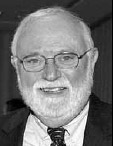
July 2, 2014
This past April, MSNBC’s Lawrence O’Donnell was on vacation with his brother Michael in the British Virgin Islands when his taxi van was hit in a head-on crash. Both sustained serious injuries.
In his first telecast since the accident, he gave a poignant telling of his story since that day, saying he felt “lucky to be alive.” His words articulate his profound sense of gratitude to all who helped. Here are some of those words:
“I want to talk about crying, because I’m also going to talk about some things that have made me cry. And I might have to pause once or twice when I do that. So, I just want you to be forewarned, because what could be more shocking than an anchorman crying? The first commandment of television is, anchormen don’t cry, which is why I will never be and will never feel like a real anchorman.
“You know, of all the advantages a boy can have growing up there’s nothing quite like a heroic big brother. And Michael O’Donnell’s three little brothers have always had that advantage every day of our lives.
“Michael saw the crash coming and yelled something, a billionth of a second before the noise started. I was looking down at a map on my iPhone. And so, it was the deafening noise that told me we were in a collision. The noise seemed to go on forever. I couldn’t see anything in the darkness except the light of the radio in the center of the dashboard in front of me. And as the front end of that taxi was being crushed that radio just kept moving closer and closer and closer to me. And I had what felt like a very long time to think about dying and what a stupid way to die this was, and to think about my daughter.
“And then the radio suddenly stopped moving. And the noise stopped. And I wasn’t dead. I could see. And I could hear. And I could move my hands and my arms worked. I wasn’t dead. I was lucky to be alive. That cliche, lucky to be alive, was suddenly so true to me, so profound. It was such a warm feeling.
“We should all feel it all the time but a lot of us don’t, until we get this close to the end. I had a couple of near-death experiences in my teens and 20s, a motorcycle, that kind of thing. But I was too young to learn the lesson. But at 7:45 p.m. on April 12, 2014, I finally got it. Lucky to be alive.”
The brothers were transported buy air ambulance to hospitals in Boston and New York, and both underwent several surgeries.
“Living among the medical community as I did for weeks was a huge revelation to me. I’d never been hospitalized before. I had never seen the extraordinary daily kindness and heroism of nurses up close. I had never depended on them.
“For weeks, I was completely dependent on them. I had only one real day and night of pain in the hospital after surgery, and it was a giant order of magnitude. The worst pain I have ever experienced. It is actually an ordeal that many post-surgical patients go through and I cannot get into the details now, because it is just too gross, trust me. I’m not kidding about that. And if you’ve been through it, you know what I’m talking about.
“A nurse named John Frank Ellis got me through that night. It was in its way as hard a night for John as it was for me. I’ve never been more dependent on anyone in my adulthood and never been more grateful.
“The next time when John came back on duty, I gave him a thank you note in a sealed envelope, with some cash in it. A lot of cash in it. A token of my indescribable gratitude. John took the envelope, the sealed envelope, he left the room, a few minutes later he came back in and he said my thanks was all that mattered to him, and he handed me back the money. And he told me that it was against his personal ethics and against hospital policy to accept gifts like that. “I had no idea. I had no idea I’d crossed a line. This was all new to me. So, you can tip people who clean your room in hotels but you can’t tip nurses, I didn’t know that. Great nurses don’t do it for the money. Yes, they care about and they rely on their paychecks, but they couldn’t do the work they do, the great nurses couldn’t do that, they couldn’t do it the way they do it, if the motivation didn’t come from the goodness of their hearts.
“The nurse who spent the most time with me in New York is Shannon Lawrence. Our shared name was less interesting to me than her first name, Shannon. As an Irish-American kid growing up in a place like Boston, I developed an ear for the ethnicity in every name. On our first day together I asked Shannon how she got an Irish first name.
“She said her father was wounded in World War II and was sent to a hospital in England for treatment. The nurses there literally did not want to touch the black soldiers in that hospital. Then an Irish nurse came along and took good care of Shannon’s father. The Irish nurse’s name was Shannon.
My nurse Shannon has spent her life sharing the same healing kindness and grace that her father’s nurse did.
“And on my last day in New York -- I told Shannon that if I had another daughter, I would name her Shannon.”
(The video of Lawrence O’Donnell’s comments can be seen here at tinyurl.com/lrowccz)

